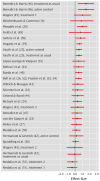A meta-analysis of cognitive remediation in schizophrenia
- PMID: 18056233
- PMCID: PMC3634703
- DOI: 10.1176/appi.ajp.2007.07060906
A meta-analysis of cognitive remediation in schizophrenia
Abstract
Objective: This study evaluated the effects of cognitive remediation for improving cognitive performance, symptoms, and psychosocial functioning in schizophrenia.
Method: A meta-analysis was conducted of 26 randomized, controlled trials of cognitive remediation in schizophrenia including 1,151 patients.
Results: Cognitive remediation was associated with significant improvements across all three outcomes, with a medium effect size for cognitive performance (0.41), a slightly lower effect size for psychosocial functioning (0.36), and a small effect size for symptoms (0.28). The effects of cognitive remediation on psychosocial functioning were significantly stronger in studies that provided adjunctive psychiatric rehabilitation than in those that provided cognitive remediation alone.
Conclusions: Cognitive remediation produces moderate improvements in cognitive performance and, when combined with psychiatric rehabilitation, also improves functional outcomes.
Conflict of interest statement
All authors report no competing interests.
Figures
Comment in
-
Review: cognitive remediation improves cognitive functioning in schizophrenia.Evid Based Ment Health. 2008 Nov;11(4):117. doi: 10.1136/ebmh.11.4.117. Evid Based Ment Health. 2008. PMID: 18952966 No abstract available.
References
-
- McGurk SR, Mueser KT. Cognitive functioning, symptoms, and work in supported employment: a review and heuristic model. Schizophr Res. 2004;70:147–174. - PubMed
-
- Mueser KT. Cognitive functioning, social adjustment and long-term outcome in schizophrenia. In: Sharma T, Harvey P, editors. Cognition in Schizophrenia: Impairments, Importance, and Treatment Strategies. Oxford, UK: Oxford University Press; 2000. pp. 157–177.
-
- Corrigan PW, Mueser KT, Bond GR, Drake RE, Solomon P. The Principles and Practice of Psychiatric Rehabilitation: An Empirical Approach. New York: Guilford; 2007.
-
- Smith TE, Hull JW, Romanelli S, Fertuck E, Weiss KA. Symptoms and neurocognition as rate limiters in skills training for psychotic patients. Am J Psychiatry. 1999;156:1817–1818. - PubMed
-
- Wykes T, Dunn G. Cognitive deficit and the prediction of rehabilitation success in a chronic psychiatric group. Psychol Med. 1992;22:389–398. - PubMed
Publication types
MeSH terms
Grants and funding
LinkOut - more resources
Full Text Sources
Other Literature Sources
Medical


